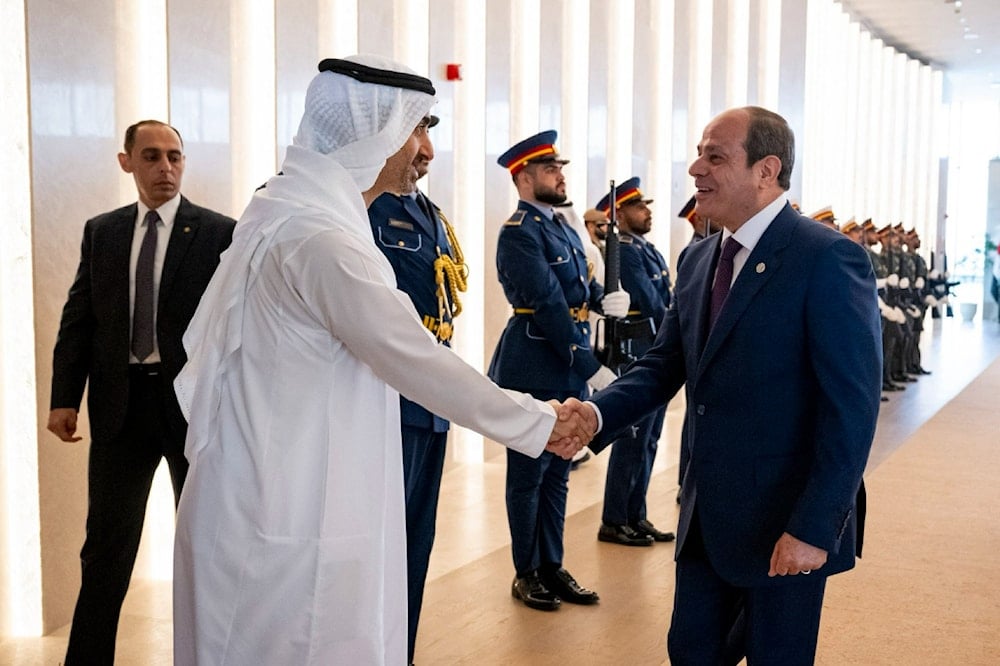Egypt, UAE leaders meet in Abu Dhabi, urge Gaza ceasefire
Egyptian Presidential Spokesperson Mohamed El-Shennawy said the two leaders explored ways to deepen economic, trade, and investment collaboration.
-

President Abdel Fattah el-Sisi and Sheikh Mohammed bin Zayed Al Nahyan shake hands at Al Shati Palace in Abu Dhabi on June 4, 2025. (Agencies)
Egyptian President Abdel Fattah el-Sisi held talks with UAE President Sheikh Mohammed bin Zayed Al Nahyan on Wednesday in Abu Dhabi, focusing on regional tensions and the future of bilateral cooperation. The meeting took place at Al Shatie Palace following an official reception ceremony, shortly after el-Sisi's arrival at Abu Dhabi International Airport.
According to Presidential Spokesperson Mohamed El-Shennawy, the two leaders explored ways to deepen economic, trade, and investment collaboration, stressing the importance of aligning development efforts with the aspirations of their citizens. Their economic dialogue comes amid strengthening strategic ties between the two countries, with the UAE having emerged as one of Egypt's key Gulf partners in recent years.
استقبل السيد الرئيس عبد الفتاح السيسي اليوم، بقصر رأس التين بالإسكندرية، سمو الشيخ محمد بن زايد آل نهيان ولى عهد أبوظبى نائب القائد الأعلى للقوات المسلحة بدولة الإمارات العربية المتحدة. pic.twitter.com/VV9VGwvE83
, Abdelfattah Elsisi (@AlsisiOfficial) March 27, 2019
Central to the meeting was the intensifying crisis in Gaza. Both presidents reaffirmed their shared stance on the urgent need for an immediate ceasefire and a captive exchange, while raising alarm over the deepening humanitarian catastrophe in the Strip.
"Sheikh Mohamed bin Zayed lauded Egypt's unyielding efforts since the outbreak of the crisis, in mediating a ceasefire agreement in the Strip, protecting the people of Gaza, and striving to alleviate their dire humanitarian suffering," El-Shennawy stated.
While the UAE continues its controversial normalization of relations with the Israeli occupation under the Abraham Accords, and engages with Washington and Tel Aviv in talks over Gaza’s future governance, both Abu Dhabi and Cairo have reaffirmed a shared stance: that genuine and lasting peace in the region cannot be achieved without the creation of an independent Palestinian state.
During the meeting, the two leaders stressed the urgent need for unrestricted humanitarian aid to reach Gaza, where "Israel’s" relentless bombardment has created a catastrophic situation. They reiterated that only a two-state solution rooted in justice and sovereignty for the Palestinian people can pave the way to true regional stability.
Egypt, despite maintaining formal diplomatic ties with "Israel" since 1979, has repeatedly acted as a key mediator and emphasized that further normalization across the Arab world must not come at the expense of Palestinian rights. Cairo continues to assert that no political settlement will be credible without addressing the core issue of occupation and statehood.
Conversely, despite its official rhetoric calling for a ceasefire in Gaza, the UAE has quietly aligned itself with Israeli and US positions during the war, continuing arms purchases from "Israel" and participating in behind-the-scenes discussions that opposed an immediate end to hostilities.
While publicly expressing concern for the humanitarian crisis and endorsing a two-state solution, Abu Dhabi has deepened its security ties with Tel Aviv under the framework of the so-called Abraham Accords, prioritizing regional power dynamics over Palestinian self-determination. This dual strategy, rhetorical support for peace, coupled with covert coordination with "Israel", has drawn criticism from many in the Arab world who view the UAE’s posture as a betrayal of the Palestinian cause.
Read more: Palestine rejects recognition-for-normalization scheme at UN
Beyond Gaza, the talks also addressed deteriorating conditions across several regional flashpoints. Discussions covered ongoing developments in Lebanon, Syria, Sudan, Libya, Yemen, and Somalia, with both leaders affirming the need to safeguard these nations' sovereignty and support efforts aimed at long-term security and development.

 3 Min Read
3 Min Read








